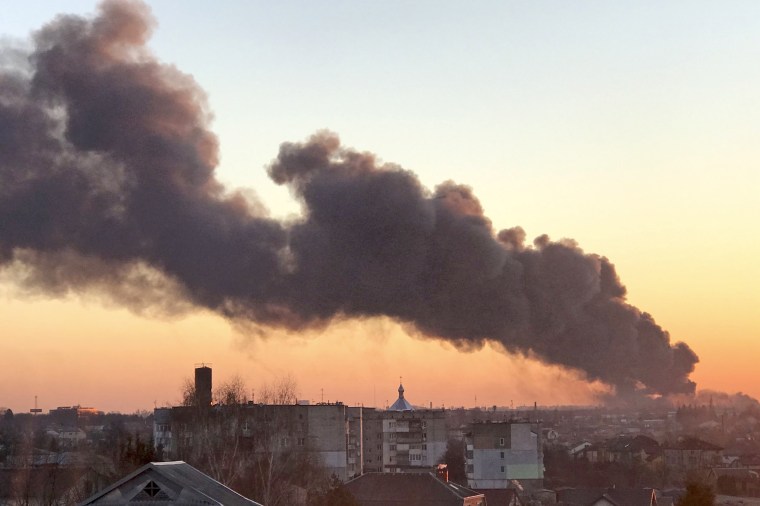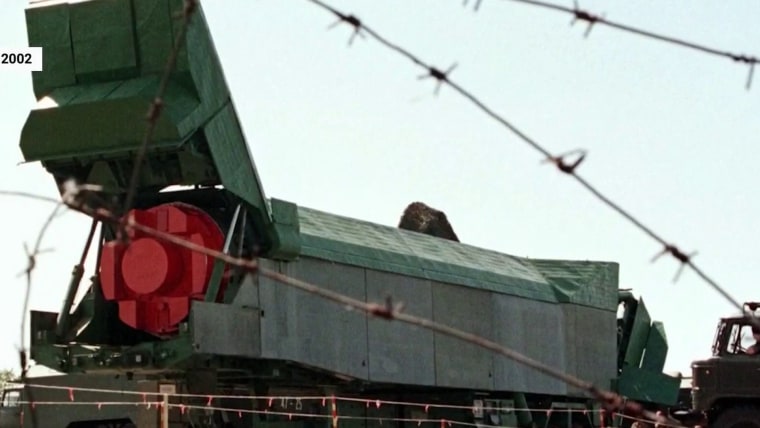
Senators mull the unthinkable: Putin detonating a nuclear bomb
Sen. Marco Rubio, R-Fla., said such an attack could trigger NATO’s Article 5, which requires a collective defense in the event of an attack on any member.
A cloud of smoke rises after an explosion Friday in Lviv, western Ukraine. AP
March 22, 2022, 12:29 PM MDT
By Scott Wong
WASHINGTON — Senators reacted with alarm to a new report that suggested Russian President Vladimir Putin could deploy a small, targeted nuclear bomb as his troops get bogged down in a costly, drawn-out battle against defiant Ukrainian fighters.
One key senator, Marco Rubio, R-Fla., said he believed such an attack could force NATO allies, including the United States, to invoke their collective defense under Article 5 of the alliance’s charter and retaliate against Russia — especially if nuclear fallout drifts over the Ukrainian border and kills or sickens civilians living in Poland or other NATO countries.
“As you detonate a nuclear weapon inside of Ukraine depending on what it is they detonate, even in a demonstration, that would spread radioactive material that would cross borders potentially,” said Rubio, the vice chairman of the Senate Intelligence Committee, who frequently tweets his analysis of the Russian invasion.
“If radioactive material blows across the Polish border, they would argue they’ve been attacked,” he added.
If radioactive material blows across the Polish border, they would argue they’ve been attacked.
SEN. MARCO RUBIO, R-FLA.
“Radiation kills people; it certainly creates long-term health problems,” he continued. “So we’re dealing in uncharted territory at that point. The danger in this process always is that … someone will do something that they don’t consider to cross the line. But the people they’re aiming at do consider it to be crossing a certain line. And that’s how you find yourself in escalations.”
Sen. Tammy Duckworth, D-Ill., a decorated Iraq War veteran who serves on the Armed Services Committee, agreed with Rubio: “If any of the fallout from that drifts over, I mean, that could be considered to be an attack” on NATO allies.

MARCH 11, 202209:50
Duckworth said she needed to study the issue more before commenting further on such a sensitive topic. But Article 5 stipulates that an attack on any NATO country is an attack on all of its members.
Any mention of nuclear warfare spurs images of the U.S. bombing of Hiroshima and Nagasaki during World War II more than 75 years ago. The twin atomic bombs flattened those Japanese cities, killing tens of thousands of civilians and creating massive mushroom clouds that could be seen for miles.
But a New York Times story on Monday detailed how Putin, feeling cornered in the conflict with Ukraine, could detonate a smaller, tactical nuclear weapon to try to gain the upper hand in a nearly monthlong war in which Russia has suffered significant and embarrassing military losses.
Experts told the newspaper that Putin could fire a nuclear weapon at an uninhabited area or over the North Sea in a bid to deter NATO allies and get Ukraine to surrender. In recent weeks, Putin himself has referred to Russia as “one of the most powerful nuclear states” and ordered his generals to put Russia’s nuclear forces on “special regime of combat duty alert.”
“I think it would take us into a place we have not been since Nagasaki, where an actual nuclear device was intentionally detonated as part of a military campaign, even if it wasn’t directed at specific targets,” Senate Armed Services Chairman Jack Reed, D-R.I., told NBC News. “So that’s crossing a huge red line. And I think the whole world would be not just shocked, but convinced of the irresponsibility of Putin.”
Sen. Shelley Moore Capito, R-W.Va., who traveled to Poland and Germany over the weekend to speak with Ukrainian refugees and U.S. troops, argued that there is no such thing as a “small” nuclear bomb.
Such a weapon would inflict “generational damage” on the region, whether it is deployed over a populated area or not, said Capito, who formerly led a Senate subcommittee on clean air and nuclear safety.
Rubio, who is a member of the “Gang of Eight” lawmakers who receive the most sensitive classified intelligence briefings, said he does not believe a Russian nuclear attack is “imminent.” But he said going nuclear is in Russia’s playbook and is an option that Rubio has been thinking about since the start of Putin’s military campaign.
“Their military doctrine that they’ve exercised anticipates that if they’re losing a conventional war against NATO, that they would detonate a nuclear weapon or even use one against NATO troops to sort of escalate and force everyone to the negotiating table,” Rubio told reporters.
“I’m not seeing anything that indicates that would be imminent, but that’d be a pretty dramatic moment in the history of the world,” he said.
Amid talk of a potential nuclear attack, President Joe Biden this week is preparing to travel to Europe, where he will join other NATO leaders in Brussels and then go on to Poland, where he will thank leaders for taking in hundreds of thousands of Ukrainian refugees.
Russia’s nuclear capabilities almost certainly will be among the issues that Biden discusses with his European allies. Speaking to reporters at the White House on Tuesday, national security adviser Jake Sullivan said the U.S. has not changed its “nuclear posture” following Putin’s recent threats but is “constantly monitoring for that contingency.”
“We take it as seriously as one could possibly take it,” Sullivan said.
While the U.S. is in the process of sending Ukraine hundreds of millions of dollars in lethal weapons and other military aid, Biden has been cautious not to escalate tensions with a nuclear-armed Russia. The commander-in-chief has rejected desperate pleas from Ukrainian President Volodymyr Zelenskyy for NATO allies to impose a no-fly zone or send fighter jets, predicting such actions would spark “World War III.”
On Monday, Biden gave a speech warning that Putin could use chemical weapons against Ukraine now that his “back is against the wall.” Biden also warned U.S. companies and other entities to harden their defenses against potential cyberattacks by Russia.
“The magnitude of Russia’s cyber capacity is fairly consequential and it’s coming,” Biden said.
Reed, the head of the Armed Services panel, predicted that a wave of new cyberattacks would likely hit the U.S. and other Ukrainian allies before Putin turned to a nuclear weapon. He said it’s unclear if cyberattacks would trigger a NATO Article 5 response given that they have been ongoing for years.
“I would assume that cyberattacks would precede any type of nuclear attack given that there’s a certain deniability, and it can be managed much more adroitly, the targets, the impacts, etc.,” Reed said in the interview.
“Cyber is just a gray area. … There’s a line between state-directed, state-organized and just criminal elements everywhere, but still, this cyber battle has been going on constantly at every moment.”
No comments:
Post a Comment